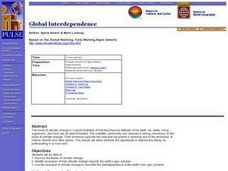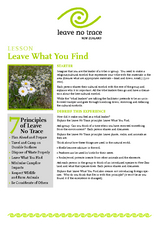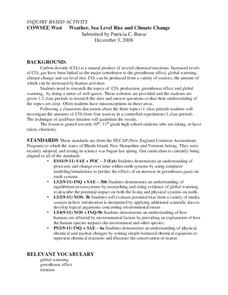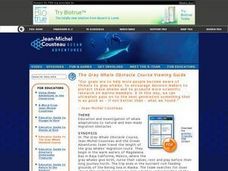NOAA
Marine Policy
Save the oceans! The 22nd installment of a 23-part NOAA Enrichment in Marine sciences and Oceanography (NEMO) program focuses on laws and marine policy. Pupils take part in an activity investigating fisheries stock data.
College Board
2013 AP® Human Geography Free-Response Questions
How have railroads influenced urban growth? What are the consequences of population booms? What has led to the growth of tech centers like Silicon Valley? A series of short-answer questions from the College Board explores the dynamics in...
Curated OER
World Geography: Global Interdependence
Students are able to discuss the theory of climate change. They identify examples of how climate change impacts the earth's geo-spheres. Students are able to use the example of climate change to describe the interdependence of the...
Curated OER
Satellites and the Radiation Budget
Students engage in a prelab discussion about the earth's radiation budget and global warming. They use "trading cards" to find specific websites to research radiation budget questions.
Curated OER
Graphing the Facts
Students investigate the correlation between our planet's weather and solar activity. They analyze and discuss data regarding the solar activity cycle, graph annual precipitation and temperature averages over a period of 100 years, and...
Curated OER
Debate Topics and Ideas
Students examine both sides of arguments surrounding given debates. They use the internet and other research to collect information to support their stand on the controversial issue. Students debate their chosen topic. This lesson plans...
Curated OER
Changing Weather: Comparing Climate from Voyageur Times to Today
Fifth graders compare climates. In this weather lesson, 5th graders observe and record weather observations and discuss the impact of weather on people. Students also discuss the concept of global warming and determine how weather...
Curated OER
The Water Cycle and Global Warming
Students study the flow of water in the environment. In this water cycle lesson students evaluate the consequences of changes in the water cycle using data.
Curated OER
Global Warming: The Greenhouse Effect Visualizer
Students work in small groups to study the various aspects of global weather and discuss the possibility of a Greenhouse Effect.
Curated OER
Leave What You Find
Young scholars explore environmental awareness by participating in a role play activity. In this cultural analysis lesson, students discuss the importance of symbolism when referring to a tribe and create their own tribe based on a small...
Wild BC
Is Climate Change Good for Us?
Is it really that big of a deal if the global climate undergoes a little change? Young environmentalists consider this very question as they discuss in small groups the impact of different climate change scenarios on their lives, their...
Polar Trec
Drawing Diatoms like Ernst Haeckel
Why do scientists rely on drawings rather than just photographs of their research studies? The lesson plan introduces drawings of microscopic organisms and the importance of accuracy. Young artists draw organisms and learn why focus and...
American Museum of Natural History
Be an Energy Saver
Small conservation steps can have large impacts. Individuals access an online checklist and rate themselves on their conservation practices. They reflect on current practices and learn about new ways to contribute and how to do better....
The New York Times
Revolt! Comparing Historical Revolutions
What elements are needed to have a revolution? How do historical revolutions from across the globe and generations compare with one another? This is an excellent activity that incorporates group work, source analysis, and an engaging...
National Park Service
Biodiversity—Bee Week
If you want scholars to fall in love with bees, this is the unit for you! Celebrate bees with a full week of material—designed for the Next Generation Science Standards—that addresses the importance of pollination and fertilization....
Chicago Botanic Garden
Carbon, Greenhouse Gases, and Climate
Climate models mathematically represent the interactions of the atmosphere, oceans, land, sun, surface, and ice. Part two in the series of four lessons looks at the role greenhouse gases play in keeping Earth warm and has participants...
Chicago Botanic Garden
Climate Change Around the World
It is unknown if cloud cover increases in response to carbon dioxide levels changing, helping climate change slow down, or if cloud cover decreases, allowing Earth to warm faster. Part four in the series of five lessons has classes...
National Renewable Energy Laboratory
Biomass: Biogas Generator
It's a gas. Middle schoolers build a biogas generator following the directions in this resource. After a few days of observation, they demonstrate that the gas given off by the decomposing manure is flammable. The activity concludes as...
Curated OER
Global Warming: The Greenhouse Effect Debate
Students gather information about the Greenhouse Effect and participate in a debate about the merits of this theory on both sides. They explore the Greenhouse Effect, and its possible long-term effects, from a variety of resources.
Space Awareness
The Intertropical Convergence Zone
Young scientists know it is hotter along the equator, but why is it also rainier? Through the process of completing two experiments and a worksheet, scholars discover the answer is the intertropical convergence zone. First, they...
Curated OER
Weather, Sea Level Rise and Climate Change
Students compare the carbon dioxide content of four different samples. In this chemistry lesson, students research the causes of global warming. They explain how humans contribute to rising global temperature.
Curated OER
Environmental Responsibility
Young scholars discuss the importance of recycling and preventing pollution. In groups, they complete mini-studies on various environmental issues and evaluate different consumer products. They use global warming data to determine the...
Curated OER
The Gray Whale Obstacle Course Viewing Guide
Students complete a worksheet while watching a film about whales. They examine the human impact on whale migration and identify adaptations the whale has acquired in able to survive. They discover how global warming has effected the...
Curated OER
How Can You Stay Fit?
Students identify ways that cardiovascular fitness is achieved and maintained. In this cardiovascular health lesson, students discuss what aerobic exercise is and list various activities which address cardiovascular fitness. Students run...

























